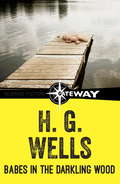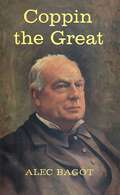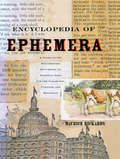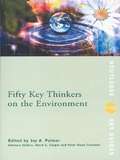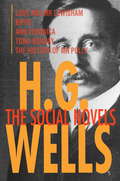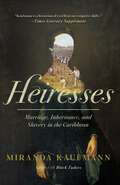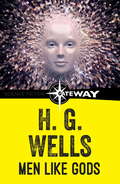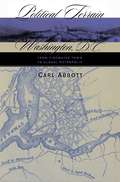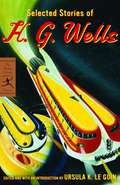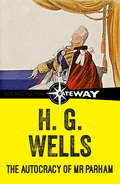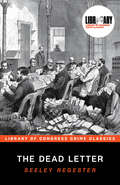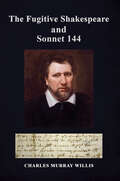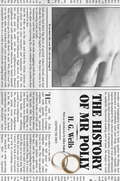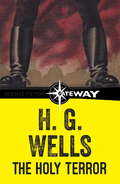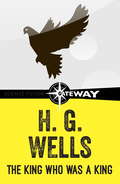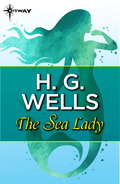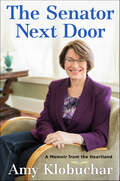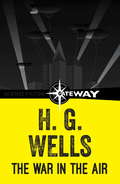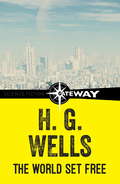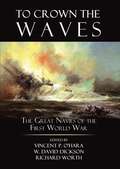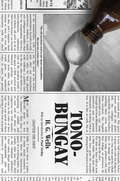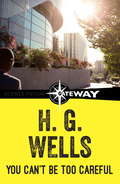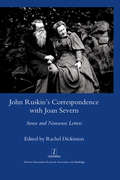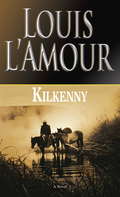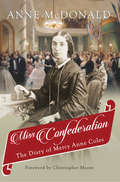- Table View
- List View
Babes in the Darkling Wood
by H.G. WellsStella has the world at her feet - good looks, brains, and a place at Cambridge University. Together with her admirer Gemini, she becomes interested in the work and mind of a psycho-therapist with exciting new ideas. However, when tragedy encroaches on their lives they soon come to realise that intellectualism brings little comfort or solace. Babes in the Darkling Wood is a powerful tale of fluctuating fortunes that presents an interesting dialogue of contemporary developments in psychoanalytical theory.
Coppin the Great: Father of the Australian Theatre
by Alec BagotGeorge Seith Coppin (1819-1906), known as 'father of the Australian Theatre', a 'low comedian', was also impresario, adventurer, politician and philanthropist. This biography is based mainly on material made available by the late Miss Lucy Coppin: her father's books, journals, biographical notes, press cut-tings, playbills, and Coppin's personal letters. From an early age he acted with his parents in a troupe of strolling players in England and the colour-and uncertainties-of this life are vividly described. At 16 he chose in-dependence and appearances in provincial England, London, and Ireland followed. In 1842, accompanied by an American actress, he migrated to Australia where, in tours of the separate colonies, George's acumen gave them starring roles and excellent receipts. As well as acting and managing, Coppin pro-moted such ventures as a zoo, roller skating, hot sea-water baths and a railway line. He was a devoted husband and parent and his philanthropic activities were legion. Twice elected to the Victorian Legislative Council, in 1858 and 1889, Coppin was also a member of the Legislative Assembly for nine years 1874 to 1889, with a break 1877-1883. He built six theatres, including one pre-fabricated in England. He made three for-tunes and lost two, restoring them through stage tours. He toured the Victorian gold-fields and New Zealand and, later, with Charles and Ellen Kean, America. This visit coincided with a presidential election and the assassination of President Lincoln.
Encyclopedia of Ephemera: A Guide to the Fragmentary Documents of Everyday Life for the Collector, Curator and Historian
by Maurice Rickards Michael Twyman Sally De Beaumont Amoret TannerThe joy of finding an old box in the attic filled with postcards, invitations, theater programs, laundry lists, and pay stubs is discovering the stories hidden within them. The paper trails of our lives -- or ephemera -- may hold sentimental value, reminding us of great grandparents. They chronicle social history. They can be valuable as collectibles or antiques. But the greatest pleasure is that these ordinary documents can reconstruct with uncanny immediacy the drama of day-to-day life.The Encyclopedia of Ephemera is the first work of its kind, providing an unparalleled sourcebook with over 400 entries that cover all aspects of everyday documents and artifacts, from bookmarks to birth certificates to lighthouse dues papers. Continuing a tradition that started in the Victorian era, when disposable paper items such as trade cards, die-cuts and greeting cards were accumulated to paste into scrap books, expert Maurice Rickards has compiled an enormous range of paper collectibles from the obscure to the commonplace. His artifacts come from around the world and include such throw-away items as cigarette packs and crate labels as well as the ubiquitous faxes, parking tickets, and phone cards of daily life.As this major new reference shows, simple slips of paper can speak volumes about status, taste, customs, and taboos, revealing the very roots of popular culture.
Fifty Key Thinkers on the Environment (Routledge Key Guides)
by Joy A. PalmerFifty Key Thinkers on the Environment is a unique guide to environmental thinking through the ages. Joy A. Palmer, herself an important and prolific author on environmental matters, has assembled a team of thirty-five expert contributors to summarize and analyse the thinking of fifty diverse and stimulating figures – from all over the world and from ancient times to the present day. Among those included are: Philosophers such as Rousseau, Spinoza and Heidegger Activists such as Chico Mendes Literary giants such as Virgil, Goethe and Wordsworth Major religious and spiritual figures such as the Buddha and St Francis of Assisi. Lucid, scholarly and informative, these fifty essays offer a fascinating overview of mankind’s view and understanding of the physical world.
H. G. Wells: Love and Mr Lewisham, Kipps, Ann Veronica, Tono-Bungay, The History of Mr Polly
by H. G. WellsDISCOVER A DIFFERENT SIDE TO H. G. WELLS . . . H.G. Wells's social tales caused a sensation when they were first published in the early twentieth century. Piercingly funny, yet sympathetic, and containing a cast of colourful characters, they have drawn comparisons to the works of Dickens and Evelyn Waugh.From the hapless Kipps, who is plunged into a world of high society, the rules of which he fails to understand, to Mr Polly, the draper, desperate to escape his shop and nagging wife, to Ann Veronica, a young woman rebelling against her father's stern patriarchal rule, these satires of Edwardian mores are both horribly funny and provoke questions about the class system and opportunities for social reform. The social novels include LOVE AND MR LEWISHAM (1900), KIPPS (1905), ANN VERONICA (1909), TONO-BUNGAY (1909) and THE HISTORY OF MR POLLY (1910).
Heiresses: Marriage, Inheritance, and Slavery in the Caribbean
by Miranda KaufmannFrom Jamaica to Charleston, Sierra Leone to India, Australia and back to England, this is the story of the heiresses—and the role they played in the history of enslavement.Through the eighteenth and early nineteenth centuries, it was a fact universally acknowledged that any man in want of a great fortune ought to find himself a Caribbean heiress. Their assets, the product of the exploitation of enslaved African men, women, and children, enabled them to marry into the top tiers of the aristocracy and influence society and politics. They fell in love (not always with their husbands), eloped, divorced, squandered fortunes, commissioned art, threw parties, went mad and (in once case) faked a daughter&’s death. In her much anticipated follow up to Black Tudors, Miranda Kaufmann peers beneath our pastel-hued, Jane Austen inspired image of the Georgian heiress to reveal a murky world of inheritance, fortune-hunting and human exploitation. She also unearths the stories of the people the heiresses enslaved, whose labor funded their lifestyles with whom their fates were intimately intertwined. Heiresses provides a compelling and often shocking account of how Britain profited and continues to profit from enslavement. In the vein of landmark books such as Empireland, Natives, They Were Her Property, and White Debt, Heiresses promises to expand and challenge our understanding of history.
Men Like Gods: Large Print
by H.G. WellsIn the summer of 1921, a disenchanted journalist escapes the rat race for a drive in the country. But Mr. Barnstaple's trip exceeds his expectations when he and other motorists are swept 3,000 years into the future. The inadvertent time travelers arrive in a world that corresponds exactly to Barnstaple's ideals: a utopian state, free of crime, poverty, war, disease, and bigotry. Unfettered by the constraints of government and organized religion, the citizens lead rich, meaningful lives, passed in pursuit of their creative fancies. Barnstaple's traveling companions, however, quickly contrive a scheme to remake the utopia in the image of their twentieth-century world.
Political Terrain
by Carl AbbottWashington, D.C., President John F. Kennedy once remarked, is a city of "southern efficiency and northern charm." Kennedy's quip was close to the mark. Since its creation two centuries ago, Washington has been a community with multiple personalities. Located on the regional divide between North and South, it has been a tidewater town, a southern city, a coveted prize in fighting between the states, a symbol of a reunited nation, a hub for central government, an extension of the Boston-New York megalopolis, and an international metropolis.In an exploration of the many identities Washington has taken on over time, Carl Abbott examines the ways in which the city's regional orientation and national symbolism have been interpreted by novelists and business boosters, architects and blues artists, map makers and politicians. Each generation of residents and visitors has redefined Washington, he says, but in ways that have utilized or preserved its past. The nation's capital is a city whose history lives in its neighborhoods, people, and planning, as well as in its monuments and museums.
Selected Stories of H. G. Wells
by H. G. Wells Ursula K. Le GuinLe Guin's selection of twenty-six stories showcases Well's genius and reintroduces readers to his singular talent for making the unbelievable seem utterly plausible.
The Autocracy of Mr Parham: Large Print
by H.G. WellsMr Parham is a traditional academic disappointed with the social trends of his time. Sir Bussy Woodcock is an intelligent but unrefined self-made millionaire. The pair happen to meet one day and form an unlikely relationship; Sir Bussy interested to learn something of culture and Mr Parham looking for funding for a high-quality periodical
The Dead Letter (Library of Congress Crime Classics)
by Seeley Regester"Another triumph with this pioneering crime novel."—Publishers WeeklyThe sixth book in the Library of Congress Crime Classics, an exciting new classic mystery series created in exclusive partnership with the Library of Congress. This classic crime fiction mystery features a love triangle with a murderous twist.An undelivered letter with a cryptic message holds the key to an unsolved murderWhen Henry Moreland is found dead on a lonely New York road after a violent storm, it seems he died of natural causes while walking to the home of his betrothed, Eleanor Argyll. An examination of the corpse reveals, however, that he was killed by a single, powerful stab wound. His wallet was untouched, eliminating robbery as the motive—but who would want to murder the well-liked and respected man?Richard Redfield, an old family friend who harbors a secret love for Eleanor, vows to bring Henry's killer to justice. Richard soon finds himself out of his element. Together with a legendary detective named Mr. Burton, he embarks on an unsuccessful mission to find the murderer. When suspicion turns to Richard himself, he leaves the family behind and goes to work in the "Dead Letter" office in Washington. Then a mysterious letter from the past turns up, and a new hunt begins...This twisting tale is the first full-length American detective novel, written under a pseudonym by Metta Victor in the 1860s. It revived American crime fiction, which had languished after Edgar Allan Poe's short stories of the 1840s. Combining elements of Wilkie Collins's The Moonstone and the "sensation" novels popular in England, it opened the doors for generations of American crime writers to follow.
The Fugitive Shakespeare and Sonnet 144
by Charles Murray WillisTHE FUGITIVE SHAKESPEARE AND SONNET 144 The discovery of a 16th century manuscript version of Shakespeare’s Sonnet 144 is the most important historical and literary find ever made relating to Shakespearean studies. The date of composition of this manuscript indicates ca.1577-78 when William Shakspere (the original spelling of his family name) was aged between 13-14 which would suggest that he couldn’t have written this Sonnet because he was too young. The story behind this discovery and how the document was found is as astonishing as how the document has managed to survive for over 400 years. The connection in this story between Shakespeare and the famous playwright Ben Jonson is also explored as it was Jonson who provided the most important evidence that Shakespeare was the author of the First Folio which was published in 1623. “At last, after more than four hundred years there is a glimmer of light at the end of the tunnel, a significant Shakespearean clue has been discovered which may help to solve the Shakespeare authorship question.” – Sir Derek Jacobi, award-winning Shakespearean actor.
The History Of Mr Polly: With an introduction by Giles Foden
by H. G. WellsMr Polly is an ordinary middle-aged man who is tired of his wife's nagging and his dreary job as the owner of a regional gentleman's outfitters. Faced with the threat of bankruptcy, he concludes that the only way to escape his frustrating existence is by burning his shop to the ground and killing himself. Unexpected events, however, conspire to lead the bewildered Mr Polly to a bright new future - after he saves a life, fakes his death, and escapes to a world of heroism and hope.
The Holy Terror
by H.G. WellsWhen Cook's newborn baby entered the world, he had nothing but hope for its future. However, it was immediately clear that this was no ordinary child - it's murderous screams seemed a dark portent. As it grew, things only got worse, and the child's mother began to despair. The new parents hoped their child would grow out of it, but soon came to realise that its inauspicious beginnings were only a sign of things to come.
The King Who was a King (Bcl1-pr English Literature Ser.)
by H.G. Wells"The King Who Was a King - The Book of a Film" is a fascinating treatise on the development of film written by H. G. Wells and first published in 1929. Writing at the when cinema was beginning to explode, Wells explores the emerging industry's history, future, and the elements of contemporary film.
The Sea-Lady: A Tissue Of Moonshine
by H.G. WellsThe Sea-Lady concerns a mermaid who comes to shore, ostensibly with the intention of joining genteel society but who really desires to seduce Chatteris, a man she once encountered near Tonga.
The Senator Next Door: A Memoir from the Heartland (Posthumanities Ser.)
by Amy KlobucharOne of the U.S. Senate's most candid--and funniest--women tells the story of her life and her unshakeable faith in our democracyMinnesota Senator Amy Klobuchar has tackled every obstacle she's encountered--her parents' divorce, her father's alcoholism and recovery, her political campaigns and Washington's gridlock--with honesty, humor and pluck. Now, in The Senator Next Door, she chronicles her remarkable heartland journey, from her immigrant grandparents to her middle-class suburban upbringing to her rise in American politics.After being kicked out of the hospital while her infant daughter was still in intensive care, Klobuchar became the lead advocate for one of the first laws in the country guaranteeing new moms and their babies a 48-hour hospital stay. Later she ran Minnesota's biggest prosecutor's office and in 2006 was the first woman elected to the U.S. Senate from her state. Along the way she fashioned her own political philosophy grounded in her belief that partisan flame-throwing takes no courage at all; what really matters is forging alliances with unlikely partners to solve the nation's problems.Optimistic, plainspoken and often very funny, The Senator Next Door is a story about how the girl next door decided to enter the fray and make a difference. At a moment when America's government often seems incapable of getting anything done, Amy Klobuchar proves that politics is still the art of the possible.
The War in the Air: Revised Edition Of Original Version (The World at War Ser.)
by H.G. WellsFollowing the development of massive airships, naïve Londoner Bert Smallways becomes accidentally involved in a German plot to invade America by air and reduce New York to rubble. But although bombers devastate the city, they cannot overwhelm the country, and their attack leads not to victory but to the beginning of a new and horrific age for humanity. And so dawns the era of Total War, in which brutal aerial bombardments reduce the great cultures of the twentieth century to nothing. As civilization collapses around the Englishman, now stranded in a ruined America, he clings to only one hope - that he might return to London, and marry the woman he loves.
The World Set Free: A Story Of Mankind
by H.G. WellsIn "The World Set Free," H.G. Wells takes a science fictional look at the future, where if world peace is to be attained through labour internationalism, it will have to be at the price of complete social and economic reconstruction. But first comes a phase of revolution - violent, very bloody, and prolonged, which in the end may fail to achieve anything but social destruction . . . "The World Set Free" is a vision of highly educated and highly favoured leading and ruling men, voluntarily setting themselves to the task of reshaping the world.
To Crown the Waves
by W. David Dickson Vincent P. Ohara Richard WorthThe only comparative analysis available of the great navies of World War I, this work studies the Royal Navy of the United Kingdom, the German Kaiserliche Marine, the United States Navy, the French Marine Nationale, the Italian Regia Marina, the Austro-Hungarian Kaiserliche und Königliche Kriegsmarine, and the Imperial Russian Navy to demonstrate why the war was won, not in the trenches, but upon the waves. It explains why these seven fleets fought the way they did and why the war at sea did not develop as the admiralties and politicians of 1914 expected.After discussing each navy's goals and circumstances and how their individual characteristics impacted the way they fought, the authors deliver a side-by-side analysis of the conflict's fleets, with each chapter covering a single navy. Parallel chapter structures assure consistent coverage of each fleet-history, training, organization, doctrine, materiel, and operations-and allow readers to easily compare information among the various navies. The book clearly demonstrates how the naval war was a collision of 19th century concepts with 20th century weapons that fostered unprecedented development within each navy and sparked the evolution of the submarine and aircraft carrier. The work is free from the national bias that infects so many other books on World War I navies. As they pioneer new ways of viewing the conflict, the authors provide insights and material that would otherwise require a massive library and mastery of multiple languages. Such a study has special relevance today as 20th-century navies struggle to adapt to 21st-century technologies.
Tono-Bungay: With an introduction by Paul Torday
by H. G. WellsGeorge Ponderevo, a student of science, is enlisted to help with the promotion of Tono-Bungay. Tono-Bungay is a harmful stimulant disguised as a miraculous cure-all, the creation of his ambitious uncle Edward. As the tonic prospers, George experiences a swift rise in social status, elevating him to riches and opportunities that he had never imagined, nor indeed desired. Meanwhile, George ricochets romantically between his unsuccessful marriage to Marion, his affair with the liberated Effie and his doomed relationship with the Hon. Beatrice Normandy, a childhood friend. But the Tono-Bungay empire eventually over-extends itself and George must try to prop up his uncle's finances by stealing the radioactive compound 'quap' from an island near Africa...
You Can't Be Too Careful
by H.G. WellsA satirical novel of one Englishman, a Mr. Edward Albert Tewler, from cradle to grave.
John Ruskin's Correspondence with Joan Severn: Sense and Nonsense Letters
by Rachel Dickinson"The great Library Edition of the Works of John Ruskin spans 39 volumes and, over the course of the century, further compilations of his private diaries and letters have appeared: but the most important epistolary relationship of his later years, shared with his Scottish cousin Joan (Agnew Ruskin) Severn, has until now been entirely unpublished. These letters - more than 3,000 of them - have been challenging for Ruskin scholars to draw upon, with their baby-talk, apparent nonsense and unelaborated personal references. Yet they contain important statements of Ruskins opinions on travel, on fashion, on the ideal arts and crafts home, on effective education and other questions: and Ruskin often used his letters to Severn as a substitute for his personal diary. In this important new edition, Dickinson presents an edited, annotated selection of a correspondence which, until now, has been almost inaccessible to scholars of Ruskin and of the Victorian period."
Kilkenny
by Louis L'AmourKilkenny wasn't looking for trouble when he entered the Clifton House stage station, but trouble found him when a reckless youngster named Tetlow challenged him, drew his gun, and paid for it with his life.Looking to escape a reputation that he never wanted, Kilkenny settles in the lonely mountain country of Utah, planning to ranch a high, lush valley. But the past is on his trail. Jared Tetlow is a powerful rancher determined to run his vast herd on the limited grasslands there--whether he has to buy out the local ranchers, run them out, or kill them. He'll cut down anyone who stands in his way, especially a man he already despises: the gunman named Kilkenny--the man who killed his son.From the Paperback edition.
Miss Confederation: The Diary of Mercy Anne Coles
by Christopher Moore Anne McdonaldHistory without the stiffness and polish time creates. Canada’s journey to Confederation kicked off with a bang — or rather, a circus, a civil war (the American one), a small fortune’s worth of champagne, and a lot of making love — in the old-fashioned sense. Miss Confederation offers a rare look back, through a woman’s eyes, at the men and events at the centre of this pivotal time in Canada’s history. Mercy Anne Coles, the daughter of PEI delegate George Coles, kept a diary of the social happenings and political manoeuvrings as they affected her and her desires. A unique historical document, her diary is now being published for the first time, offering a window into the events that led to Canada’s creation, from a point of view that has long been neglected.
